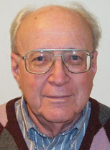Mathematician Eugene Dynkin dies at 90
By Bill Steele

Eugene Dynkin, the A.R. Bullis Professor of Mathematics emeritus, died Nov. 14 at Cayuga Medical Center. He was 90.
“A worldwide leader in probability theory and a superb lecturer who dazzled generations of students, Eugene Dynkin served the Department of Mathematics with passion for over 30 years," said Laurent Saloff-Coste, professor and chair of mathematics.
Born in Leningrad in 1924 as Evgenii Borisovich Dynkin, he suffered greatly under the oppressive Stalinist regime. His family was exiled to Kazakhstan; his father “disappeared.” Dynkin called it “almost a miracle” that he was admitted to Moscow State University at age 16.
“Every step in my professional career was difficult because the fate of my father, in combination with my Jewish origin, made me permanently undesirable for the party authorities at the university,” he once said.
His first breakthrough, at the age of twenty, was the use of "simple roots" and "diagrams" to study Lie algebras (named for Norwegian mathematician Sophus Lie), which describe tiny but complicated motions in space and have applications in particle physics and the management of differential equations. His work inspired an entire school in Lie groups in Moscow in the 1950s. These diagrams, now widely known as "Dynkin diagrams" or "Coxeter-Dynkin diagrams," became and remain an important tool for elementary particle physicists.
Later he devoted most of his career to probability theory. He became one of the most respected world experts in the theory of Markov processes, which describe a series of random events in which the future depends only on the present and not on previous events. His 1959 book, “Foundations of the Theory of Markov Processes,” is still a fundamental text, and he introduced what is now known as “Dynkin’s formula,” which makes predictions about events in a Markov series. He also played a key role in the development of what mathematicians call measure valued processes and superdiffusions.
He emigrated to the United States in 1976 and joined the Cornell faculty in 1977. “I found here kind and friendly colleagues; gorgeous scenery of forests, lakes and waterfalls; and a few bright graduate students with whom I have started a seminar of the Moscow type,” he recalled. “The most exciting was a new feeling of freedom and independence of big and little bosses - something which I never enjoyed in my previous life.” His Moscow-style freshman seminars often led undergraduates quickly into advanced areas. He retired in 2010.
According to colleagues in Ithaca, Dynkin always taught his students that one of the greatest values in mathematics is its unity, as revealed in the links between its various fields. He saw connections between Lie algebra and probability theory unnoticed by most mathematicians, and worked early on probability and statistics parallel to his work on algebra.
In recognition of his contributions to two areas of mathematics and his production of outstanding research students in the U.S. and Russia, he was awarded the Leroy P. Steele Prize for Lifetime Achievement from the American Mathematical Society in 1993. He was a fellow of the American Academy of Arts and Sciences and a member of the National Academy of Sciences.
He is survived by his wife, Irene; a daughter, Olga Barel; three grandchildren; and seven great-grandchildren.
Services were held Nov. 18.
Media Contact
Get Cornell news delivered right to your inbox.
Subscribe